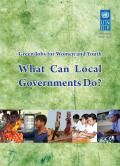The United States, Europe, and non-governmental international organizations are seeking to encourage the creation of green jobs and the use of non-hydropower renewable energy. This paper discusses the challenge in defining green jobs and reviews definitions across different countries, states, and NGOs. The paper describes some of the costs the United States has faced in creating jobs through programs funded by the Departments of Labor and Energy. The paper concludes by comparing the experiences of China and the United States in the use of renewable energy.
This article appeared in the Energy Economics Supplemental Issue: Green Perspectives.
This issue of the International Journal of Labour Research focuses on the question of whether the jobs that are emerging in the efforts to reach sustainable development can be described as “decent”. A series of case studies is presented which demonstrates that this seems to be far from the case. While these results remain very partial, this should be seen as an important reminder that “green” employment is not decent by definition and that like in any other sector, green jobs require careful stewardship from public authorities to ensure that workers are able to exercise their rights. This is all the more the case given the central role government policy plays in creating the enabling conditions for these industries to emerge and thrive.
This journal issue includes case studies on Korea, China and South Africa.
By presenting a selected number of successful national experiences from 2012, the progress report illustrates the different levels at which the International Labour Organization (ILO)'s Green Jobs Programme operates. The report also provides an update on the activities which will unfold in 2013 with the continued support of the Programme’s networks and partners.
This report includes case studies on Mexico, Kenya, Thailand, South Africa, the Dominican Republic, China, Turkey, Zambia and Indonesia.

This paper presents examples of policies and programmes initiated by local governments that promote green jobs especially for women and youth. The aim is to inspire more local governments to consider policies that address the economic, social and environmental dimensions of sustainable development. The report includes case studies from South Africa, the Phillippines, Senegal, Bolivia, Argentina, Colombia, Bangladesh, Zimbabwe, Lesotho, Burundi and Viet Nam.
This report summarizes the main findings of a national green jobs assessment conducted in Mexico in 2013. The assessment revealed how many green jobs currently exist in the country and which sectors show the strongest potential for further green jobs creation.
